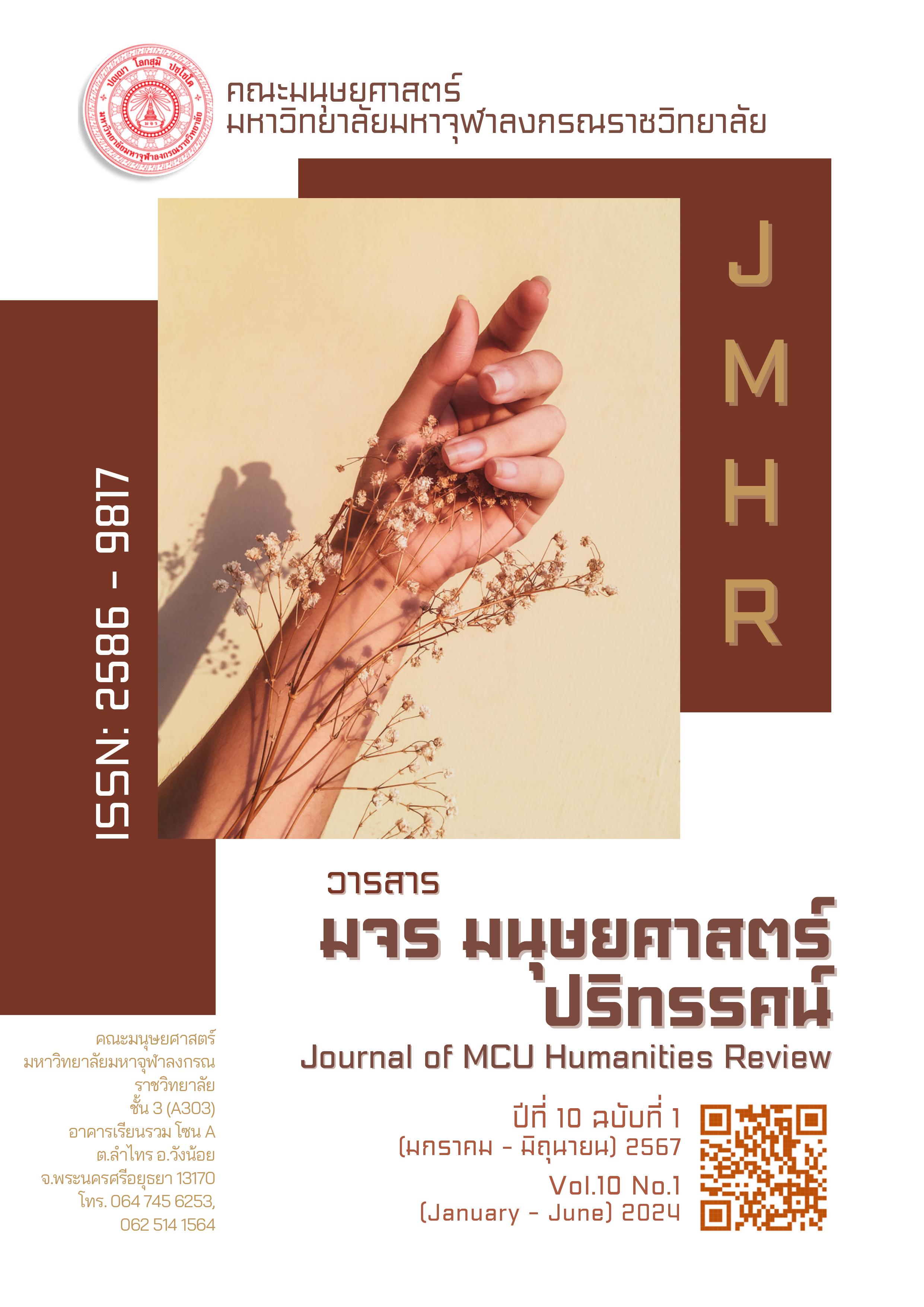โปรแกรมพุทธจิตวิทยาวิถีนิเวศภาวนาเพื่อการอนุรักษป่าไม้อย่างยั่งยืนสำหรับเยาวชน
คำสำคัญ:
พุทธจิตวิทยา, นิเวศภาวนา, อนุรักษ์ป่าไม้, เยาวชนบทคัดย่อ
การวิจัยนี้มีวัตถุประสงค์ 1. เพื่อวิเคราะห์หลักพุทธธรรมแนวคิดทฤษฎีจิตวิทยาที่เกี่ยวข้องและนิเวศภาวนาเพื่อสังเคราะห์แนวคิดพุทธจิตวิทยาวิถีวิถีนิเวศภาวนา 2. เพื่อสังเคราะห์คุณลักษณะและปัจจัยของโปรแกรมพุทธจิตวิทยาวิถีวิถีนิเวศภาวนาเพื่อการอนุรักษ์ป่าไม้อย่างยั่งยืนสำหรับเยาวชน 3. เพื่อพัฒนาและประเมินโปรแกรมพุทธจิตวิทยาวิถีวิถีนิเวศภาวนาเพื่อการอนุรักษ์ป่าไม้อย่างยั่งยืนสำหรับเยาวชน การวิจัยนี้เป็นการวิจัยแบบผสานวิธีและการวิจัยกึ่งทดลอง โดยใช้วิธีวิจัยเชิงปริมาณและวิธีวิจัยเชิงคุณภาพขยายผลวิธีวิจัยเชิงปริมาณ กลุ่มตัวอย่างคือ เยาวชนโรงเรียนมัธยมวัดสำนักคร้อ กําหนดตัวอย่างโดยใช้โปรแกรม G*Power ได้กลุ่มตัวอย่าง จํานวน 60 คน เครื่องมือที่ใช้ในการวิจัย ได้แก่ แบบวัดเจตคติและความตระหนักรู้สิ่งแวดล้อมเกี่ยวกับการอนุรักษ์ป่าไม้ของเยาวชนและโปรแกรมพุทธจิตวิทยาวิถีนิเวศภาวนาเพื่อการอนุรักษ์ป่าไม้อย่างยั่งยืนสำหรับเยาวชน วิเคราะหข้อมูลเชิงปริมาณใช้สถิติ t-test การวิเคราะห์ความแปรปรวนสองทางแบบวัดซ้ำ (two – way repeated measures ANOVA) และวิเคราะห์ข้อมูลเชิงคุณภาพด้วยวิธีการวิเคราะห์เนื้อหา
ผลวิจัยพบว่า
- แนวคิดพุทธจิตวิทยาวิถีนิเวศภาวนา คือ แนวคิดบูรณาการหลักพุทธธรรมไตรสิกขาและหลักพุทธธรรมปรโตโฆสะร่วมกับทฤษฎีจิตวิทยาและแนวคิดนิเวศภาวนา 2. คุณลักษณะและปัจจัยของโปรแกรมพุทธจิตวิทยาวิถีวิถีนิเวศภาวนา คือ 1.การเห็นความงาม 2. การเห็นคุณค่า 3. การเกิดความกลัวว่าป่าไม้จะหมดไป 4. การเกิดความตั้งใจจะอนุรักษ์ 3. ผลการทดลองโปรแกรมเกิดพฤติกรรมสิ่งแวดล้อมคือ เจตคติและความตระหนัก 4 ด้าน พบว่า เยาวชนลุ่มทดลองมีคะแนนเฉลี่ยสูงกว่าก่อนการทดลองและสูงกว่ากลุ่มควบคุม อย่างมีนัยสําคัญทางสถิติที่ระดับ .05 นอกจากนี้ ผลวิเคราะห์ ข้อมูลเชิงคุณภาพยืนยันสนับสนุนข้อมูลเชิงปริมาณ พบว่า ผู้เข้าร่วมโปรแกรมได้เกิดพฤติกกรรมสิ่งแวดล้อมในการอนุรักษ์ป่าไม้ซึ่งนำไปสู่การอนุรักษ์ป่าไม้อย่างยั่งยืนต่อไป
เอกสารอ้างอิง
ค้าวิเศษ เพ็งวันสวรรค์. (2561). แนวทางการอนุรักษ์และฟื้นฟูทรัพยากรป่าไม้เขตป่าสงวนแห่งชาติดงหัวสาวพื้นที่บ้านน้้าพาก เมืองปทุมพร แขวงจำปาสัก สาธารณรัฐประชาธิปไตยประชาชนลาว. วารสารนวัตกรรมการจัดการเทคโนโลยีสารสนเทศ, 6(2), 9.
ชลธิรา ชาวบ้านกร่าง. (2561). การสำรวจความตระหนักทางสิ่งแวดล้อมของนักเรียนชั้นประถมศึกษาปีที่ 6 สำนักงานเขตพื้นที่การศึกษาประถมศึกษาสุพรรณบุรี เขต 3. ใน การประชุมวิชาการของมหาวิทยาลัยเกษตรศาสตร์ ครั้งที่ 56 (น. 172). กรุงเทพฯ: มหาวทิยาลยัธุรกิจบัณฑิตย์.
พระครูพิพิธจารุธรรม, ดร. (2557). แนวทางการอนุรักษ์ป่าตามหลักคำสอนพระพุทธศาสนาเถรวาท (รายงานผลการวิจัย). พิษณุโลก: วิทยาลัยสงฆ์พุทธชินราช.
มหาจุฬาลงกรณราชวิทยาลัย. (2535). พระไตรปิฎกภาษาบาลีฉบับมหาจุฬาเตปิฏกํ 2500. กรุงเทพฯ: โรงพิมพ์มหาจุฬาลงกรณราชวิทยาลัย.
ลินดา การภักดี. (2561). การพัฒนาชุดฝึกอบรมสิ่งแวดล้อมน่ารู้เพื่อเสริมสร้างความตระหนักรู้ต่อสิ่งแวดล้อมสำหรับนักเรียนชั้นประถมศึกษา (ปริญญานิพนธ์ปริญญาดุษฎีบัณฑิต). มหาวิทยาลัยศรีนครินทรวิโรฒ. กรุงเทพฯ.
สำนักงานคณะกรรมการพัฒนาการเศรษฐกิจและสังคมแห่งชาติ. (2560). แผนพัฒนาเศรษฐกิจและสังคมแห่งชาติ ฉบับที่สิบสอง (พ.ศ. 2560 - 2564). สืบค้น 2 ธันวาคม 2564, จากhttp://www.nesdb.go.th/ewt_dl_link.php?nid=6422
ดาวน์โหลด
เผยแพร่แล้ว
รูปแบบการอ้างอิง
ฉบับ
ประเภทบทความ
หมวดหมู่
สัญญาอนุญาต
ลิขสิทธิ์ (c) 2024 วารสาร มจร มนุษยศาสตร์ปริทรรศน์

อนุญาตภายใต้เงื่อนไข Creative Commons Attribution-NonCommercial-NoDerivatives 4.0 International License.






